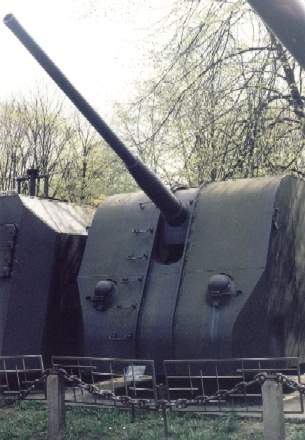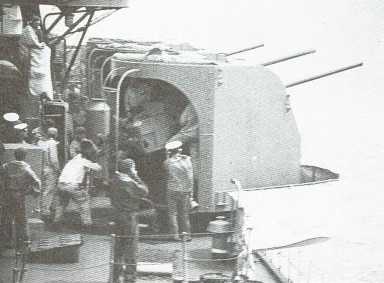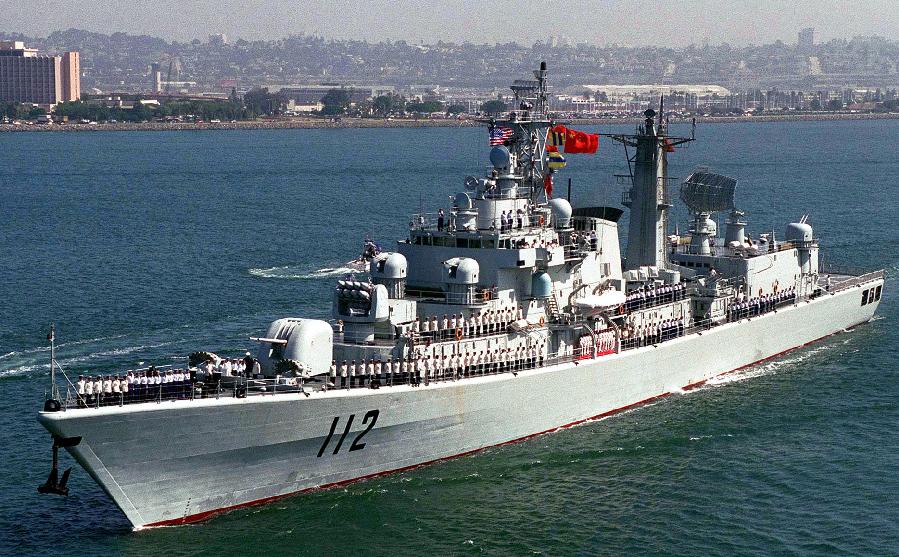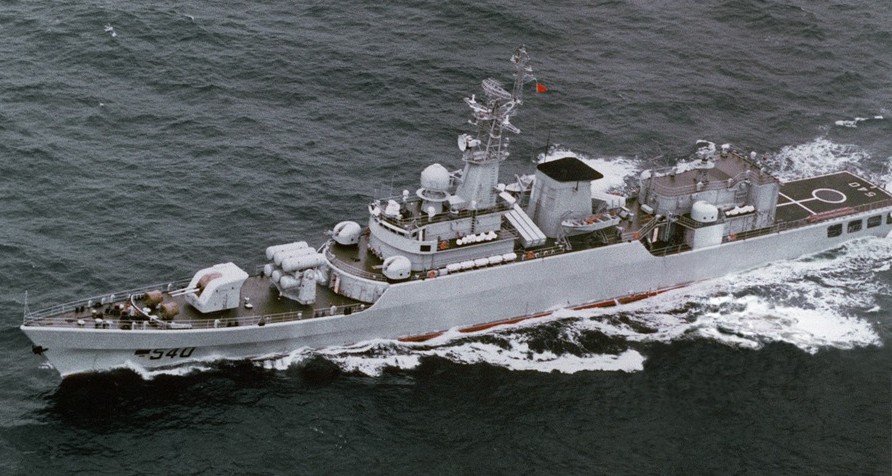
This weapon was a result of the unsuccessful trials of the B-14 gun in 1935 and was started by the "Bolshevik" factory in 1936. A prototype gun was made in 1937 for trials, but it was returned to the factory later that same year for changes. Trials restarted in 1938, but the gun was again returned to the factory for additional changes. Trials restarted once more in 1939, but yet again the gun was not accepted. However in 1940, with war looming, the need for heavy AA guns overwhelmed other considerations and mass production was started. By beginning of 1941 some 42 guns had been produced, unfortunately, they were reported as being almost non-functioning.
In 1941 an improved version of the gun was made and designated B-34-U, but World War II delayed production of this version until 1946. 213 of this new design were manufactured by 1950. The main difference between B-34 and B-34-U was the replacement of the pneumatic-powered semi-automatic breech with a spring-powered semi-automatic breech, similar to other Russian 10 cm (3.9") weapons. This last modification still didn't fix all of the problems, as there were incidents of rounds falling out from the breech and the fuze setting mechanism was failure-prone.
These defects were finally fixed on the B-34-USM version which was designed in 1948. 114 of these mounts were built between 1949 and 1952. In 1953 these and other mounts were modernized to increase the ROF and fix other defects.
Today, this gun is obsolescent and is used only on second-line Russian ships such as the Riga-class frigates and Don-class submarine tenders.
The gun was made from free tube, casing and the breech. The breech was horizontal blade type with pneumatic semi-automatic breech in the B-34 and a spring semi-automatic breech in all other versions. In 1951 "Sfera-50" control system was accepted in service. It could control the guns for targets up to 35,000 yards (32,000 m) and aircraft flying at speeds up to 985 fps (300 mps).
Source notes: This weapon is identified as "100 mm/56 Model 1934" in most English language references, including those listed below.
The People's Republic of China has produced an auto-loading version of this gun which is used in twin mountings.
| Designation | Russia / USSR: 100 mm/56 (3.9") B-34 Pattern 1940 PRC: 100 mm/56 (3.9") Type 79 |
|---|---|
| Ship Class Used On |
|
| Date Of Design | 1937 |
| Date In Service | 1940 |
| Gun Weight | 2.424 tons (2.463 mt) |
| Gun Length oa | 228.15 in (5.795 m) |
| Bore Length | 210.63 in (5.350 m) |
| Rifling Length | 182.09 in (4.625 m) |
| Grooves | 40 |
| Lands | N/A |
| Twist | N/A |
| Chamber Volume | 487 in3 (7.98 dm3) |
| Rate Of Fire |
|
| Type | Fixed |
|---|---|
| Weight of Complete Round | about 61.7 lbs. (28 kg) |
| Projectile Types and Weights | AA grenade: 34.39 lbs. (15.6 kg) AA (ZS-56): 34.39 lbs. (15.6 kg) AA (ZS-56P): 35.05 lbs. (15.9 kg) HE mod 1928 (F-56): 34.83 lbs. (15.8 kg) Diving: 33.07 lbs. (15.0 kg) Star Shell (SB-56): 35.27 lbs. (16.0 kg) ECM (anti radar) (PB-56) |
| Bursting Charge | AA grenade: 2.67 lbs. (1.21 kg) AA (ZS-56): 2.71 lbs. (1.23 kg) AA (ZS-56P): 1.74 lbs. (0.79 kg) HE mod 1928 (F-56): 2.76 lbs. (1.25 kg) Diving: 6.28 lbs. (2.85 kg) Star Shell (SB-56): 0.03 lbs. (0.015 kg) ECM (anti radar) (PB-56): reflective material DOS-15 |
| Projectile Length | AA grenade: 5.3 calibers AA (ZS-56): 5.13 calibers AA (ZS-56P): 5.0 calibers HE mod 1928: 5.2 calibers Diving: 5.04 calibers Star Shell (SB-56): 5.2 calibers |
| Propellant Charge | 13.2 lbs. (6 kg) |
| Muzzle Velocity | AA grenade: 2,953 fps (900 mps) HE mod 1928: 2936 fps (895 mps) Diving: 820 fps (250 mps) Star Shell (SB-56): 2,119 fps (646 mps) Type 79: 3,004 fps (915 mps) |
| Working Pressure | 19.1 tons/in2 (3,000 kg/cm2) |
| Approximate Barrel Life | 800 |
| Ammunition stowage per gun | Sovetskii Soyuz and Kronshtadt: 300 rounds Yastreb, Kola: 250 rounds Riga: 850 rounds total PRC: N/A 1 |
- ^The PRC Type 76 has 26 ready service rounds per gun.
| Elevation | Distance |
|---|---|
| Maximum Range | 24,323 yards (22,241 m) |
| Elevation | Distance |
|---|---|
| AA Ceiling | 32,800 feet (10,000 m) |
| Maximum Timer Range | 10,821 yards (9,895 m) |
The ammunition for B-24 and B-34 guns was interchangeable.
Most of the above data is from "Encyclopedia of Russian Artillery."
"The Naval Institute Guide to World Naval Weapon Systems 1991/92" credits this weapon with a maximum range of 17,500 yards and an effective range of 10,900 yards (16,000 m / 10,000 m).
"Naval Weapons of World War Two" credits this weapon with a maximum range of 24,500 yards (22,400 m) and an AA ceiling of about 49,200 feet (15,000 m).
The PRC Type 76 has a maximum range of 24,600 yards (22,500 m) and a maximum AA ceiling of 49,000 feet (15,000 m). Weight of projectile unavailable.
| Designation |
|
|---|---|
| Weight | Single Mount B-34: 13.53 tons (13.75 mt) Twin Mount M3-14: 68.61 tons (69.7 mt) Twin Mount Type 76: 34 tons (35 mt) |
| Elevation | Twin Mounts: -8 / +85 degrees Single Mounts: -5.5 / +85.5 degrees Twin Mount Type 76: -5 / +85 degrees |
| Rate of Elevation | Twin Mounts: 10 degrees per second Single Mounts (electrical): 18-20 degrees per second Single Mounts (by hand): 6.2 degrees per second Twin Mount Type 76: 25 degrees per second (23 degrees per second2 acceleration) |
| Train | Twin Mounts: 360 degrees Single Mounts: 352 degrees Twin Mount Type 76: +/- 225 degrees (450 degrees total) |
| Rate of Train | Twin Mounts: 12 degrees per second Single Mounts (electrical): 20-25 degrees per second Single Mounts (by hand): 6.5 degrees per second Twin Mount Type 76: 20 degrees per second (20 degrees per second2 acceleration) |
| Gun Recoil | Twin Mounts: 23.6 in (60 cm) Single Mounts @ 0 degrees: 20.4 in (52 cm) Single Mounts @ 85 degrees: 23.6 in (60 cm) Twin Mount Type 79: N/A |




Data from:
- "Naval Weapons of World War Two" by John Campbell
- "The Naval Institute Guide to World Naval Weapon Systems 1991/92" by Norman Friedman
- "Battleships: Allied Battleships in World War II" by W.H. Garzke, Jr. and R.O. Dulin, Jr.
- "Sovetskie Boevye Korabli 1941-45: IV Vooruzhnie" (Soviet Warships 1941-45: Volume IV Armament) by A.V. Platonov
- "Entsiklopedia Otechestvennoi Artillerii" (Encyclopedia of Fatherland (Russian) Artillery) by A.V. Shirokorad
Special help from Vladimir Yakubov
